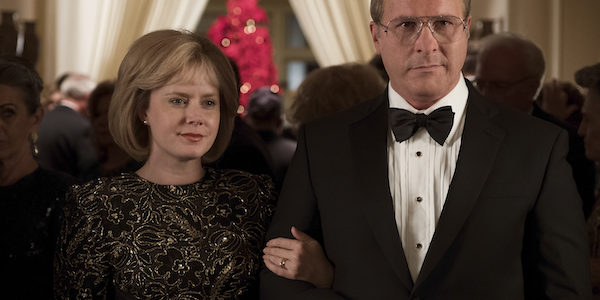
ReelBob: ‘Vice’ ★★
By Bob Bloom
No matter your feelings about Dick Cheney, it must be acknowledged that he changed the vice presidency and — for better or for worse — altered the foreign policy of the United States.
But who is Dick Cheney, and how did he rise so high in the government? That is what writer-director Adam McKay strives to explain in “Vice.” Unfortunately, he falls short of his mark.
“Vice” is like a Shakespearean tragedy — with Cheney and his wife, Lynne, as Lord and Lady Macbeth. Except it’s the American people who — as McKay implies — stood by apathetically and, so, pay the ultimate price for the couple’s unbridled ambition.
The problem with the movie is McKay’s script; it is superficial and simplistic. Cheney is a complicated individual who McKay portrays as a sinister figure continually lurking behind the throne, awaiting his chance to pounce.
We get no indication of from whence his unbridled aspirations sprang. The only hint we get is a scolding he receives from Lynne before they are married, threatening to dump Cheney unless he shows some spine and determination.
Nothing is said about Cheney’s formative years, his parents — or how or where he acquired his amoral nature. It is as though he simply sprung out of the earth, fully grown.
Cheney masked his purpose in silence and servility. In his government posts, he always was alert — listening for a tidbit he could use to advance his own station or that of the official he was aiding.
McKay, throughout, portrays Lynne Cheney as the alpha personality. When the Cheneys’ daughter, Mary, comes out to her parents, Dick comforts her, while Lynne’s main concern is how it will impact her husband’s political future.
It’s not easy to separate fact from McKay’s imagination, especially concerning events and conversations behind closed doors in the various halls of power, as well as those within the Cheney household.
All of that, though, should not deter you. The high drama that is Cheney’s life is — at times — stranger than fiction. McKay just follows the general outlines about Cheney without being concerned about filling in many of the blanks.
At times, “Vice” plays as if Michael Moore had decided to direct a feature film about the former vice president. The movie is funny and critical, but also disparaging about complicit government officials who would condone many of Cheney’s operations.
Cheney is presented as someone continually seeking more — be it money, prestige or power. Those around him, instead of being shocked, seem impressed by the stealth methods he devises to accrue more control of whatever plan he undertakes.
McKay offers a very witty moment after President George H.W. Bush is denied a second term by Bill Clinton. I won’t spoil it for you, but you will know it when you see it.
A phone call from Texas Gov. George H. Bush gets Cheney back in the game. Bush, who is running for president, asks him to head the search committee to find his running mate.
Cheney assesses the situation — and Bush — and decides the time is right to spring. He allows Bush to convince him to be his running mate. Winning the presidency, and knowing Bush dislikes the minutiae that comes with the Oval Office, the president-elect gladly gives Cheney the keys to the kingdom.
Then, follows the tragedy of 9/11, and Cheney finally sees his opportunity to start reshaping the United States — and the world — as he believes it should be.
The tragedy as shown in “Vice” is that no one in — or out — of government confronted or defied Cheney. The silence of others made us all unwitting accomplices to a man — and his cabal of minions — who created “fake news” to convince the nation to go to war with Iraq — not to topple its dictator or end a supposed nuclear threat — but to grab the riches of that nation’s oilfields.
“Vice” is not so much an unflattering portrait of Cheney and his wife, as it is an indictment of those who turned a blind eye and allowed Cheney to sacrifice thousands of Americans, and hundreds of thousands of Iraqi lives, for greed.
As Cheney, Christian Bale goes all in. He gained about 40 pounds and, as the film progresses, becomes more and more unrecognizable. He speaks in a clipped, staccato manner, never wasting words, but phrasing his thoughts in a concise manner so that those around him know exactly what he means.
Amy Adams is refreshing as the cold and ruthless Lynne Cheney. Underneath her genteel façade is a determined and calculating individual who continually works to help her husband advance through the bureaucracy, until he reaches the pinnacle of power.
The characterizations of Sam Rockwell as George W. Bush and Steve Carell as Donald Rumsfeld are rather cartoonish and basically serve as patsies for Cheney to manipulate.
A nameless character, played by the versatile Jesse Plemons, who serves as the film’s narrator, seems totally extraneous.
“Vice” is a flawed movie because McKay cannot set a consistent tone. Sometimes, the film plays like a comedy; at other moments, it’s a political drama.
Cheney deserves serious examination and a deeper probe into his actions. “Vice,” unfortunately, is not that vehicle.
I am a founding member of the Indiana Film Journalists Association. My reviews appear at ReelBob (reelbob.com) and Rottentomatoes (www.rottentomatoes.com). I also review Blu-rays and DVDs. I can be reached by email at bobbloomjc@gmail.com or on Twitter @ReelBobBloom. Links to my reviews can be found on Facebook, Twitter, Google+ and LinkedIn.
VICE
2 stars out of 4
(R), violent images, language